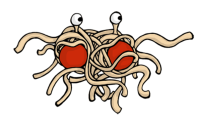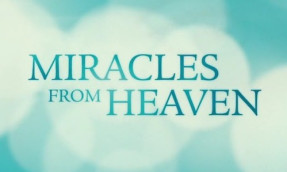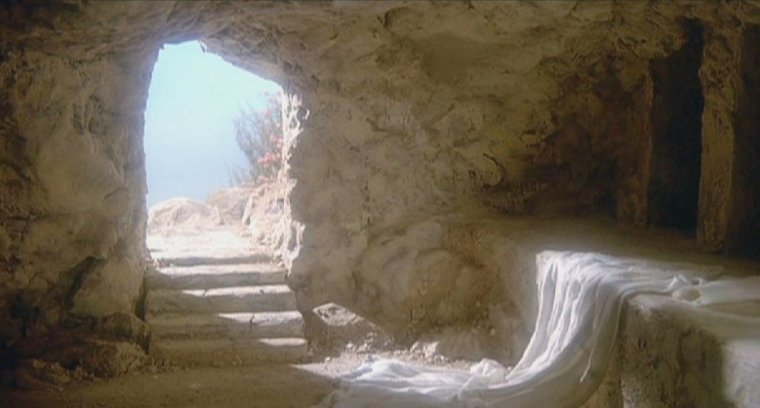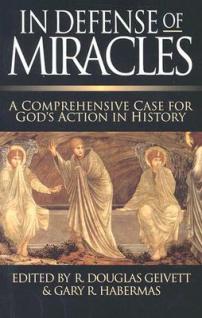I had an agenda when I started writing this post. I’m coming off a post that was significantly viewed and shared and a great confidence booster. So, as I was deciding what I’d like to cover for my next topic, I started hashing out ideas. “Dear Naturalists, supernatural events DO occur” was the first title of my paper. As I penned my outline I was excited—this is going to blow the hinges right off of the naturalistic worldview. Epic!
But there was a problem.
For my post to hold any merit, naturalist must stop being naturalists. That is to say, the naturalistic worldview presupposes that super-natural events do not occur. Therefore, no amount of “proof” would come without some degree of skepticism. I put proof in quotes because not all proof is accepted (more on this later). Let’s look at this slightly different to make the point.
 A common atheist argument against God is the Flying Spaghetti Monster. The argument, generally speaking, states there is just as much evidence for FSM as God. The atheist then compares the ideas: if you don’t believe in one you must not believe in the other (or vice-versa) because the evidences are the same. Christians will rebut, “We have the Bible; there is no FSM holy text”. This is problematic because it creates a circular argument; God is true because it says so in the Bible, and the Bible is true because God says so. Therefore, it is not (always) beneficial to argue for Christianity by saying, “The Bible says…” because, to an atheist, the Bible carries no more spiritual weight than a piece of toast with Jesus burnt on it.
A common atheist argument against God is the Flying Spaghetti Monster. The argument, generally speaking, states there is just as much evidence for FSM as God. The atheist then compares the ideas: if you don’t believe in one you must not believe in the other (or vice-versa) because the evidences are the same. Christians will rebut, “We have the Bible; there is no FSM holy text”. This is problematic because it creates a circular argument; God is true because it says so in the Bible, and the Bible is true because God says so. Therefore, it is not (always) beneficial to argue for Christianity by saying, “The Bible says…” because, to an atheist, the Bible carries no more spiritual weight than a piece of toast with Jesus burnt on it.
 The same idea carries over to naturalism. Naturalism presupposes that nothing exists outside of natural laws and elements. As I scribbled out my first rough draft, it became increasingly clear I was presenting a circular argument to make my case: The supernatural does exist because miraculous events have happened. It is easy to think this is evidentiary, but in reality it’s a matter of perspective. Most supernatural events can be explained naturally, others can be dismissed as a hoax, fabrication, or mysterious; anything is possible as long as it’s not supernatural. For example, a movie set to debut in 2016 starring Jennifer Garner, “Miracles From Heaven” gives a great illustration. The story follows a Christian family struck with the failing health of their young daughter. The trailer reveals several doctors diagnosing various disease/illnesses until one doctor states, “There is no cure.” You can watch the trailer here, but the line I want to focus comes near the middle of the trailer. Garner, the mom, is realizing that an unfortunate fall from a tree cured her daughter: “So you’re telling me, that when this baby girl fell 30 feet, she hit her head just right, and it didn’t kill her, and it didn’t paralyze her; it healed her? That’s impossible.”
The same idea carries over to naturalism. Naturalism presupposes that nothing exists outside of natural laws and elements. As I scribbled out my first rough draft, it became increasingly clear I was presenting a circular argument to make my case: The supernatural does exist because miraculous events have happened. It is easy to think this is evidentiary, but in reality it’s a matter of perspective. Most supernatural events can be explained naturally, others can be dismissed as a hoax, fabrication, or mysterious; anything is possible as long as it’s not supernatural. For example, a movie set to debut in 2016 starring Jennifer Garner, “Miracles From Heaven” gives a great illustration. The story follows a Christian family struck with the failing health of their young daughter. The trailer reveals several doctors diagnosing various disease/illnesses until one doctor states, “There is no cure.” You can watch the trailer here, but the line I want to focus comes near the middle of the trailer. Garner, the mom, is realizing that an unfortunate fall from a tree cured her daughter: “So you’re telling me, that when this baby girl fell 30 feet, she hit her head just right, and it didn’t kill her, and it didn’t paralyze her; it healed her? That’s impossible.”
The movie is based on a true story and is expected to be widely praised by the Christian community and largely dismissed by skeptics and naturalists. That’s because of the presuppositions we carry as we analyze the evidence. I believe in a personal God who can and does work miracles; I see no problems with the premise of the movie. A naturalist, however, will see things more naturalistically—maybe it was luck, or coincidence, or embellished, but it was absolutely not God, that’s impossible. And this is where I set out to rethink the super-natural. A supernatural event could have just made the disease of the little girl disappear; “Mommy, mommy, wake-up! I’m all better”, The End. Instead, it was a fall; it was a fluke; it was happenstance. It was not laden with angelic proclamation nor prophesied 300 years earlier or found on some 5 ¼ floppy disk (anyone remember those?) illustrating God’s plan in this little girl. This, really, seems more natural than super natural. In fact, if you look at most miracles, there is most likely a natural explanation. And, those that don’t may yet have naturalistic causes we just don’t know about. If God does indeed work miracles super-naturally, He has a pleasant way of showing it naturalistically. Therefore, sorry, Christians the supernatural does not exist.
I know what you’re thinking. At least, I know what I would be thinking. Determining ‘most’ in terms of miracles is not the same as determining all miracles are naturalistic. Surely there was at least one, supernatural, miraculous event in history, notably that of the resurrection of our Lord and Savior Jesus Christ. Aha! Righteo. But that is exactly what brings me to my next, and most prominent point. If the supernatural does exist, what does it look like and how is it identifiable considering naturalistic causes, generally, suffice.
 In my last post (here), I rethought some common vernacular as it pertained to evolution. I defined macro- in two different ways. (1) a large change in a short time (ape to man) (2) a series of many small events producing a large change over a long time (ape to ape-like to man-like to man). For more clarification, I recommend reading the original post. I mention it here because I want to be clear that as I reference the term ‘marco-’ I am using the same prefix used by evolutionists/naturalists. That is, what if super-natural wasn’t one significant change producing a specific result (marco- definition #1), but was a series of smaller natural events producing a desired outcome? Let’s break it down a little.
In my last post (here), I rethought some common vernacular as it pertained to evolution. I defined macro- in two different ways. (1) a large change in a short time (ape to man) (2) a series of many small events producing a large change over a long time (ape to ape-like to man-like to man). For more clarification, I recommend reading the original post. I mention it here because I want to be clear that as I reference the term ‘marco-’ I am using the same prefix used by evolutionists/naturalists. That is, what if super-natural wasn’t one significant change producing a specific result (marco- definition #1), but was a series of smaller natural events producing a desired outcome? Let’s break it down a little.
Just as this post highlights contrasting worldviews of Christianity and Naturalism, intelligent design and evolution have similar contrasting views. Intelligent design argues (among other things) that the design of the cell gives the impression it was intelligently created. By that, intelligent design claims that components within the cell, at the microscopic level, are completing tasks that other cells benefit from. A very (very) simplistic way to understand this is the idea that genetic code in the brain controls functions at the toes without the benefit of cognitive function; I do not mentally wish my toe nails to grow. This understanding is the catalyst for comparing the supernatural with the natural. That is to say, intelligent design is no more claiming that cells work differently according to ID theory as it does according to evolutionist theory than supernaturalists argue nature works differently than naturalist. The laws of nature are the laws of nature whether you believe in God or not. Therefore, what-if supernaturalism includes macro-naturalism (definition #2) and therefore necessitates supernaturalism. Lost yet? Not to worry, it’s so simple a caveman could work it out (or anyone who stayed at a Holiday Inn Express last night).
Supernatural events are really macro-natural events
In the book, “In Defense of Miracles: A Comprehensive Case for God’s Action in History” various authors piece together what a miracle is and is not. A miracle is, “an event (1) brought about by the power of God that is (2) a temporary (3) exception (4) to the ordinary course of nature (5) for the purpose of showing that God has acted in history.” (pg 72). According to this book, miracles could be defined as marco-naturalism definition #1. However, I want to be clear, supernatural events need not be miraculous—though they certainly can be. To highlight this contrast, let’s examine the resurrection of Jesus.
 By using the 5 point definition of miracles as illustrated by Purtill (chapter 3, above), Jesus’ resurrection was:
By using the 5 point definition of miracles as illustrated by Purtill (chapter 3, above), Jesus’ resurrection was:
- (clearly) brought about by the power of God
- Temporary – it only happened once
- An exception – resurrection is not the norm
- Not ordinary course of nature – (Heb 9:27)
- For the purpose of showing that God acted in history – beautifully, I might add
But this is hardly the whole of the resurrection story. Prior to the resurrection was Jesus’ triumphant entrance into Jerusalem. In order for his entrance to fulfill prophesy, he’d need to enter riding on a humble donkey (Zech 9:9). Considering Jesus didn’t even have a place to lay his head (Luke 9:58), he certainly did not have stray donkey’s set aside for just such an occasion. So, he sent two disciples to the next town and said, “as you enter [the next town], you will find a colt tied there, which no one has ever ridden. Untie it and bring it here. If anyone asks you, ‘Why are you untying it?’ say, ‘The Lord needs it.’” (Luke 19:30-31). As the story goes, the disciples found the donkey,[i] encountered a man (just as the Lord said), who accepted the excuse—the Lord needs it—seemingly without question (as no author revealed any differently), and the narrative continues.
Similarly, at last supper, Jesus and his followers had no place to eat the Passover meal. “What should we do Jesus?”, asked every disciple. “Go into the city to a certain man and tell him, ‘The Teacher says, My appointed time is near. I am going to celebrate the Passover with my disciples at your house.’” (Matt 26:18). If this were me, at this point I’d start doubting our success the minute we walked out of the room. But, sure enough, a room was prepared and a small detail of the story begins to unfold (Gen 14:18, foreshadowing).
These two accounts depict highly natural events accomplishing supernatural significance. Further, they give insight into how God works in daily life. Allow me to make one more correlation to drive home my point. In the book, Dawkins Black Box, Michael J. Behe lays out the intricacies needed to make a trap in the woods: vines set up in just the right place, tree branches pulled in the right direction to provide spring (without breaking), leaves scattered about to provide concealment, and a slip-knot to grab the prey. If one were to look at each piece of the trap individually, there is no way to conclude intelligence or design—a vine is just a vine, a knot is just a knot, a branch a branch, etc. But piecing it all together, in just the right way, for just the right result necessitates both intelligence and design.
And this is exactly where we see the supernatural. Maybe it was a drunken car ride (How did I make it home?); maybe it was a team of scientist working together to make the medicine which now keeps you alive; maybe was a heart attack your brother had that led you to get checked; or maybe it was an entire life of circumstances that brought you to this moment. Whatever it is was/is, it’s happening all around. It’s happening naturalistically to a supernatural significance. And one thing is for certain, if the supernatural can happen naturally, then there is no reason to doubt the supernatural happening supernaturally. Why would God create a naturalistic world if he needed to thwart its laws every time He interacted within it? Further, doesn’t a macro-naturalistic understanding answer a lot of questions about God knowing the number of hairs on your head (Luke 12:7), the theological idea that God is all around us (omnipresence), and even the guiding process of evolution (should we need it to exist)? Therefore, sorry, naturalists, the supernatural does exist.
[i] Colt and donkey correlation is found in Matthew 21:1-2, Mark 11:1-2, and John 12:14.

Im not really a fan of this post as “supernatural” can imply a lot of things and its not just theists who believe in “supernatural”.
LikeLike
I appreciate your honesty. So i can learn and better incorporate other views in future posts, what does supernatural mean to you?
LikeLike
Supernatural itself refers to anything that isnt understood scientifically(yet) and doesnt apply to natures laws (as of now). I feel that there could very well be more going on than what is scientifically proven. I know may atheists who believe in spirits or other things considered supernatural. Supernatural can imply things after death, different plains, the power of positive energy ect.
What is considered supernatural in todays day may very well be natural and prove new guidelines for our so called “natures laws”. Not all of the ‘supernatural world’ refers to a god. I apologize because i feel like im not making my point very well.
LikeLike
These are really good points and I think you associated then well. One of the issues we have collectively is a foundational view set — a lot of words mean a lot of different things to different people. For example, not all atheist believe in the literal definitive of atheism, no god or gods. Same issue here, I use supernatural as a way of defining that which is beyond natural laws and /or beyond scientific understanding which (i think) most atheist and (surely) all naturalist /materialist would say does not exist. In that way, I love how you brought up the idea we just may not know how to test supernatural events, meaning what is supernatural now may not be supernatural in the future.
To confront this issue, I brought up the idea of design, specifically a booby trap in the woods (from Behe’s ‘Dawkins Black Box’) idea that at some point it is no longer coincidence and must be intentional. And, once we see purpose in naturalistic events, it must follow that the purpose is a consequence of a relationship. Relationships do not exist apart from some sort of being. Which draws the conclusion that supernatural events, guided by purpose and relationship, necessitate a God (or many gods). But what absolutely cannot be, from a purposeful, intentional, macro -natural event, is the absence of intelligence and therefore the absence of God.
Would you draw a different conclusion? And again, thanks for taking the time to engage
LikeLike
I disagree with your statement on most atheists because atheism is simply one belief. Also ive never heard of an atheist disagreeing with atheism being a belief that a god or gods dont exist (unless using the word towards a specific god and even then its not far from the definition, its just not excluding more than the specific god at hand).
Im going to be completely honest and say im struggling to understand the rest of your comment(which may be because of my situation today) but im not sure what conclusion you came to so i cant very well agree or disagree. I think life itself is purpose, i dont think purpose itself necessitates a god or gods. but personally i was trying to speak objectively in this discussion (as much as one can) without imputing my personal beliefs on a gods influence or lack of.
LikeLike
Speaking as a Naturalist, one point of contention I would have with this post is in its characterization of Naturalist presuppositions. Now, I obviously cannot speak for all who claim to be Naturalists, but I know quite well that I am certainly not alone in what I am about to say.
I do not presuppose “that nothing exists outside of natural laws and elements.” Rather, I see no good reason to think that the concept of the “supernatural” represents a cogent idea. In general, the definitions which I have been offered for the term “supernatural” are either vague and unfalsifiable (eg, “the great, incomprehensible something”) or else incoherent (eg, “that which is outside of space-time”).
To that end, the definition which you attempt to lay out, in the article, is quite novel (I don’t think I have ever heard this idea before); however, it still seems fairly vague. You seem to be saying that the “macro-natural” is defined as a confluence of many individual, natural events which culminate in some particular effect. Are you trying to say that all “macro-natural” events are supernatural (ie, that the terms are interchangeable)? Or are you trying to say that there are some “macro-natural” events which are supernatural, while others are not?
If the former, the position seems quite odd, because nearly any effect which can be identified is due to a confluence of a great many individual, natural events. In essence, this would be to claim that nearly everything is supernatural, which I do not believe to be your intention.
If the latter, all we’ve done is to kick the can down the road, a bit. We are still left wondering how to differentiate those events which are supernatural from those which are not. We do not have any clear method for this, making the distinction between “supernatural” things and other things seem rather arbitrary.
Have I missed something in your position which might clarify these questions?
LikeLiked by 1 person
Hi BP! Thanks for coming back and keeping me on track. I truly appreciate your input. Anyone who can clearly, and successfully, prove a number that is not 1 can still equal 1 is a great resource to learn from (your post .999…=1; great stuff). Anyway, if I can I’m going to work backwards so I can end with a question about your response.
I read your question as, am I arguing for (1) all macro-natural events are supernatural, or (2) some macro-natural events are supernatural. You are correct, option 1 does not fit the intent of the article. Option 2 more closely hits the mark, but I would like to build on it briefly. I made the attempt in my post to correlate Intelligent Design (ID)theory as a visual contrast; we can postulate ID because we see so much purpose at each level the cell it becomes harder to believe it was chance, or luck (this does not assume it couldn’t be, only drawing a comparison to ideas). The same idea with option 2, it’s not that we can’t believe it was chance or luck that a macro (many) sequence of events transpired, but after a certain amount of (let’s call them) coincidences, it gives the appearance of supernatural interaction. I hear non-Christians/non-religious people say things like, “The stars were looking out for me”, “Someone got my back on that one” or references to guardian angels, mother nature, or I assume a host of other ideas. In this idea (and you are right, it’s new so certainly subject to scrutiny), God is working across many platforms naturalistically to produce macro-results. So, it is not really the idea to identify WHICH events are supernatural and more the idea THAT events are supernatural.
To add another level, option 1 isn’t the focus, but once we assume the possibility of option 2 (that God works through natural forces), option 1 is completely possible; God very much can be working in every detail (forming you in the womb, counting the hairs on your head, etc.). It does not assume God must, but does necessitate that he can. Does that clear it up?
Lastly, I want to ask why presupposition is a poor term? Naturalism, as I understand it, is a worldview that rejects supernatural events by claiming a naturalistic event is always a better explanation (even if the natural law explaining it isn’t known yet). In this view, even a clear and concise view of the supernatural would be rejected because the option falls outside of the naturalist view. So I can better engage my audience, can you help clarify my position? And while I’m asking, is there a clear & concise view of a supernatural being you would accept?
LikeLike